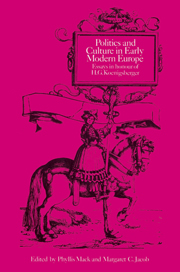Book contents
- Frontmatter
- Contents
- Introduction
- The court of the Spanish Habsburgs: a peculiar institution?
- The magnificent Lorenzo de' Medici: between myth and history
- Political rhetoric and poetic meaning in Renaissance culture: Clément Marot and the Field of Cloth of Gold
- The unlikely Machiavellian: William of Orange and the princely virtues
- The Estates of Brabant to the end of the fifteenth century: the make-up of the assembly
- Presents and pensions: a methodological search and the case study of Count Nils Bielke's prosecution for treason in connection with gratifications from France
- Between Bruni and Machiavelli: history, law and historicism in Poggio Bracciolini
- Constitutional discourse in France, 1527–1549
- Lieuwe van Aitzema: a soured but knowing eye
- John Calvin's contribution to representative government
- Luther and the humanists
- Scholars and ecclesiastical history in the Early Modern period: the influence of Ferdinando Ughelli
- ‘By an Orphean charm’: science and the two cultures in seventeenth-century England
- The crisis of the European mind: Hazard revisited
- Isaac Beeckman and music
- Decadence, shift, cultural changes and the universality of Leonardo da Vinci
- Bibliography of the writings of HELMUT GEORG KOENIGSBERGER
- Index
Luther and the humanists
Published online by Cambridge University Press: 20 October 2009
- Frontmatter
- Contents
- Introduction
- The court of the Spanish Habsburgs: a peculiar institution?
- The magnificent Lorenzo de' Medici: between myth and history
- Political rhetoric and poetic meaning in Renaissance culture: Clément Marot and the Field of Cloth of Gold
- The unlikely Machiavellian: William of Orange and the princely virtues
- The Estates of Brabant to the end of the fifteenth century: the make-up of the assembly
- Presents and pensions: a methodological search and the case study of Count Nils Bielke's prosecution for treason in connection with gratifications from France
- Between Bruni and Machiavelli: history, law and historicism in Poggio Bracciolini
- Constitutional discourse in France, 1527–1549
- Lieuwe van Aitzema: a soured but knowing eye
- John Calvin's contribution to representative government
- Luther and the humanists
- Scholars and ecclesiastical history in the Early Modern period: the influence of Ferdinando Ughelli
- ‘By an Orphean charm’: science and the two cultures in seventeenth-century England
- The crisis of the European mind: Hazard revisited
- Isaac Beeckman and music
- Decadence, shift, cultural changes and the universality of Leonardo da Vinci
- Bibliography of the writings of HELMUT GEORG KOENIGSBERGER
- Index
Summary
It may at first sight appear that Luther's central doctrine of Justification by Faith Alone must divide him from the humanists, but this notion would seem entirely erroneous, for it depends upon a misreading of Luther's anthropology and upon an anachronistic misuse of the term ‘humanist’. Let us clear the ground by a brief glance at each of these points.
Luther's rigorous interpretation of St Paul, which deprives man of all power to save himself, refers to the higher plane of human destiny: the plane of salvation. Luther does not make us automata on the worldly plane, where man does enjoy Free Will and cannot disclaim responsibility. Considering the all-importance of salvation, Luther devoted a quite surprising amount of his writings and activities to the problems of fallen mankind in this terrestrial life, problems about which something could be done, and on which his own ceaseless counselling could be genuinely serviceable. Whatever we may think of his theology, his practical views – on everything from the structure of the Holy Roman Empire down to the organization of grammar schools – are in general marked by bold common sense and forthright expression. In the second place, let me restate what I regard as the proper use of the word humanist, the meaning with which it was normally invested from the late fifteenth century to the nineteenth.
- Type
- Chapter
- Information
- Politics and Culture in Early Modern EuropeEssays in Honour of H. G. Koenigsberger, pp. 199 - 214Publisher: Cambridge University PressPrint publication year: 1987
- 1
- Cited by

